internet nation
Johannah Rodgers Netprov Interview, Oct 2022
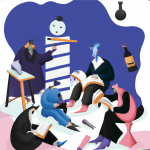
Rob Wittig and Johannah Rodgers – an independent scholar and a digital writer – discuss the collaborative and community-building nature of Netprov.
Image: DALL·E 2023-03-02 19.55.13 - "a group of people writing collectively a novel on financial crisis."
Jean Sramek Netprov Interview, Oct 2022
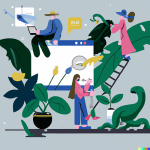
Rob Wittig and Jean Sramek - a playwright and netprov contributor – discuss how netprov as networked collaborative writing has changed since one of its earliest instance, Grace, Wit & Charm.
Image: DALL-E, at a prompt: “A group of people, plants and animals collaborating on digital platforms to write a poem”
Claire Donato Netprov Interview, Dec 2022
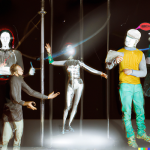
Rob Wittig and Claire Donato - a writer, a multidisciplinary artist, and a netprov contributor – discuss how a sense of performativity linked with playfulness and joy of collaborative improvisation constitute the very core of netprov.
Image: DALL-E, at a prompt: “A futuristic image of a group of people and AI improvising a theater play”.
United Forces of Meme in Spontaneous Netprov (or how many tweets it takes to transform #Kaliningrad into #Kralovec)
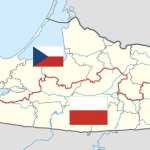
Anna Nacher explores the emergence and spread of the viral hashtag "Kralovec," a satirical Czech language meme protesting the Russian annexation of Ukrainian territory in September 2022. In discussing the social and political impact of memes as collaborative sites of making meaning through media, Nacher analyzes the "creative frenzy" that emerges when protest becomes memetic.
Riderly waves of networked textual improvisation: an interview with Mark Marino, Catherine Podeszwa, Joellyn Rock, and Rob Wittig.
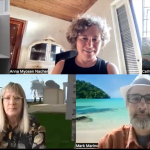
Anna Nacher chats with Mark Marino, Cathy Podeszwa, Joellyn Rock, and Rob Wittig—artists, designers, and new media theorists all—to discuss the impetus and impact of their long-running netprov collaborations (communal and improvisational creative writing conducted online). Interview conducted October 2022.